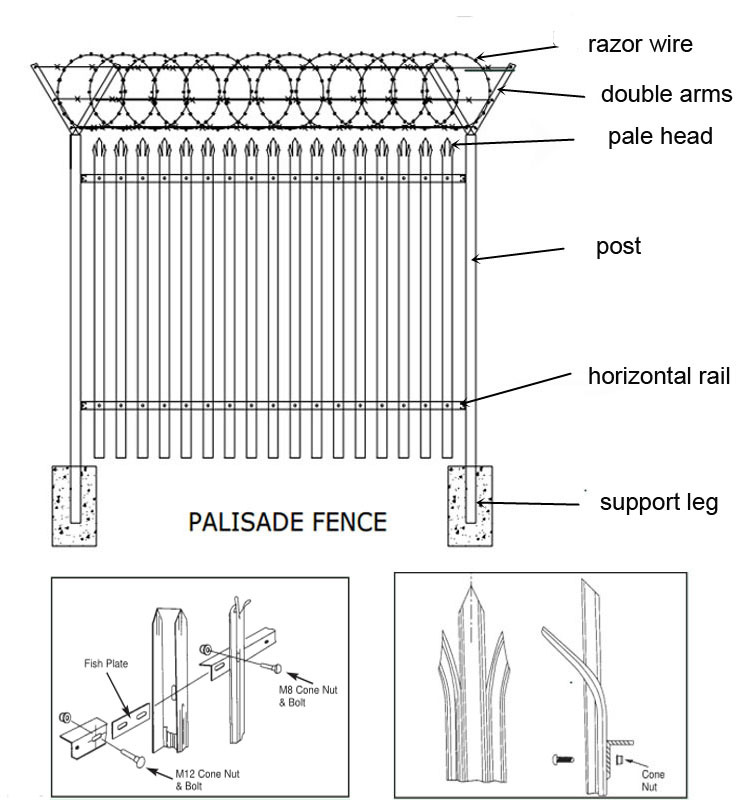Jul . 28, 2024 16:13 Back to list
Comprehensive Guide to Expanded Metal Sheet Pricing and Market Trends for Industry Buyers
Understanding the Pricing of Expanded Metal Sheets
Expanded metal sheets have gained significant popularity in various industries due to their versatility, strength, and aesthetic appeal. A common question among buyers is about the pricing of these materials. In this article, we will explore the factors that influence the pricing of expanded metal sheets, along with a general overview of a typical pricelist.
What is Expanded Metal?
Expanded metal is a type of metal that has been cut and stretched to form a mesh-like pattern. This process results in a strong and lightweight material that can be used in diverse applications ranging from security fencing to decorative elements in architecture. The unique design of expanded metal allows for airflow, visibility, and drainage, making it suitable for various more functional purposes.
Factors Influencing Pricing
1. Material Type The type of metal used significantly affects the cost. Common materials for expanded metal sheets include aluminum, stainless steel, and carbon steel. While aluminum is lightweight and resistant to corrosion, stainless steel offers exceptional durability, but often comes at a higher price point. Meanwhile, carbon steel is typically the most cost-effective option, but it may require protective coatings to prevent rust.
2. Thickness and Gauge The thickness of the metal sheet (measured in gauge) plays a crucial role in determining the price. Thicker sheets are usually more expensive than thinner ones due to the increased amount of material used and the energy required for production. Buyers should consider their specific application needs, as a thicker sheet may provide additional strength and support.
3. Sheet Size and Configuration Expanded metal sheets come in various sizes and configurations, which can also impact pricing. Larger sheets may offer economies of scale, while custom sizes may incur additional cutting fees. The mesh pattern (the size and shape of the openings) can also lead to different price points; intricate or specialized patterns may be more costly than standard designs.
expanded metal sheet pricelist

4. Finish and Treatment The surface finish of the expanded metal can influence its price. Options include galvanized (zinc-coated for corrosion resistance), powder-coated, or painted finishes. While these treatments add to the cost, they often extend the lifespan of the product, making them a worthwhile investment for certain applications.
5. Market Demand and Supply Like any other commodity, the pricing of expanded metal sheets is influenced by market dynamics. Fluctuations in the prices of raw materials, changes in demand from the construction, automotive, and manufacturing sectors can cause prices to rise or fall. It's important to stay updated on market trends for more accurate pricing.
Typical Pricing Overview
While exact prices may vary by region and supplier, a general range for expanded metal sheets may start from as low as $0.50 per square foot for basic carbon steel sheets and escalate to over $5.00 per square foot for specialized stainless steel options. Custom sizes, unique patterns, or additional finishes can further increase these prices.
For instance, a standard 4x8-foot sheet of aluminum expanded metal may cost around $150, while a similar-sized stainless steel sheet can range from $300 to $600, depending on the gauge and finishes. It's advisable for buyers to request quotes from multiple suppliers to gauge the current market prices and secure the best deal.
Conclusion
In summary, understanding the factors that influence the pricing of expanded metal sheets is crucial for making informed purchasing decisions. By considering material types, thicknesses, sizes, finishes, and market conditions, buyers can better navigate the complexities of pricing and select the right product for their needs. As the demand for expanded metal continues to grow across various industries, staying informed on current trends and prices will empower buyers to maximize their investments.
-
Hop Dipped Galvanized / PVC Coated Temporary Fence - Anping County Xingzhi Metal Wiremesh Products Co.,Ltd | Durable, Versatile, Secure
NewsAug.04,2025
-
Double Loop Concertina Razor Barbed Wire Coil - High-Security Fencing
NewsAug.04,2025
-
Hop Dipped Galvanized / PVC Coated Temporary Fence-Anping County Xingzhi Metal Wiremesh Products Co., Ltd.|Durable Temporary Fencing, Corrosion Resistant Solutions
NewsAug.03,2025
-
Hop Dipped Galvanized / PVC Coated Temporary Fence - Anping County Xingzhi Metal Wiremesh Products Co., Ltd|Durable Temporary Fencing Solutions&Customizable Security Systems
NewsAug.03,2025
-
Hop Dipped Galvanized / PVC Coated Temporary Fence - Anping County Xingzhi Metal Wiremesh Products Co., Ltd.|Corrosion Resistant&Modular Design
NewsAug.03,2025
-
Galvanized Iron Wire Anti Mosquito Window Screen Net | Durable
NewsAug.03,2025



